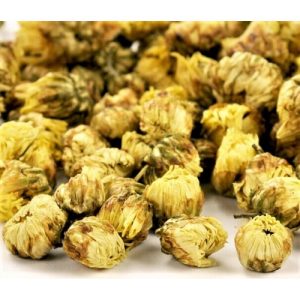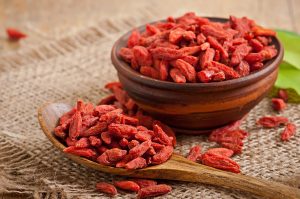The Two Best Herbs for Your Eyes are a Flower & a Berry
“Let food be thy medicine.” ~ Hippocrates
Flowers and berries for your eyes? You bet. Nature holds so many amazing medicines in various forms and we are blessed to have extensive knowledge of these in TCM, thanks to centuries of herbal pharmacological study. You may have heard Tamara refer to these in her Facebook Live Videos as “yao yao.” Meaning “very important,” this designation indicates herbs that are essential – specifically in reference to certain health conditions. Today, we’d like to talk about these amazing herbs for the eyes.
Between televisions, cell phones, computers and all manner of screens, our eyes face many challenges in our modern times. Most of us have experienced eye strain or fatigue as a result, at one time or another. All this is in addition to the myriad other challenges that can affect the eyes – allergies, wind, air pollution, to name a few, but also internal challenges like stress or an imbalance in Liver qi.
When your eyes are feeling red, painful, blurry or just plain tired, you can reach for these two herbs and make a tasty tea (add a few of each to boiling water and steep for 10 minutes)…
Ju Hua / Chrysanthemum
With its vasodilative and antibiotic properties, this white or yellow flower is one of nature’s hidden gems and can be used in the treatment of many different conditions, especially when combined with other herbs for synergistic effect. Some of these conditions include headache, fever, and dry mouth, but its superpower is benefitting the eyes. In fact, Ju Hua (pronounced “joo-hwah”) is one of the most commonly used herbs in treatment of the following eye disorders by correcting imbalances in the Liver and Lung channels: 
- Redness
- Swelling
- Pain
- Blurred vision
- Dizziness
- Near-sightedness
- Superficial visual obstruction
- Certain kinds of visual disturbances
Gou Qi Zi / Lycium Fruit
This gently sweet berry, also known as barbary wolfberry and matrimony vine fruit, is both tasty and powerfully medicinal. It stimulates the immune system, helps increase the production of red and white blood cells, and has even been shown to lower blood pressure in clinical studies. In TCM, it is often used to tonify Liver and Kidney Yin, which has the ancillary benefit of brightening the eyes since these systems are closely connected energetically.  Gou Qi Zi (pronounced “goh-chee-zuh”) also enters the Lung channel and goes to the Heart, making it a very versatile healer. For the eyes, it helps with:
Gou Qi Zi (pronounced “goh-chee-zuh”) also enters the Lung channel and goes to the Heart, making it a very versatile healer. For the eyes, it helps with:
- Blurry vision
- Dizziness
- Diminished visual acuity
- Dryness or tearing with exposure to wind
- Spasm
The Importance of Consulting Your Practitioner
There are certain cautions that should be observed when taking any medicine – even herbs. Ju Hua, for example, is not recommended for patients with certain Stomach conditions or particular kinds of deficiency because it is cold. And Gou Qi Zi, which can be cloying, should not be used by those with Spleen and Stomach deficiencies or excess conditions and caution should be taken during pregnancy, as it can stimulate uterine contractions.
If you are experiencing eye issues of any kind and think these yao yao herbs may be right for you, give us a call or book an Herbal Consult online today!
Source:
John K. Chen & Tina T. Chen. Chinese Medical Herbology and Pharmacology. Art of Medicine Press, 2001.

